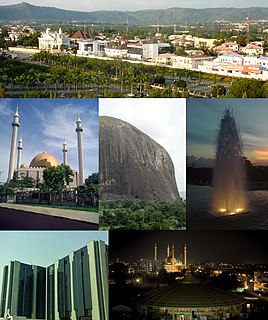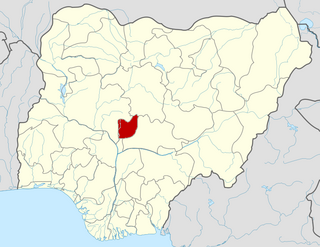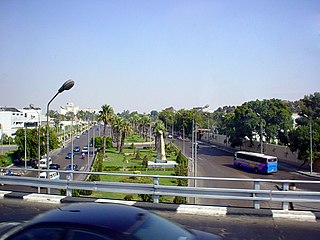
Abuja is the capital city of Nigeria located in the centre of the country within the Federal Capital Territory (FCT). It is a planned city, designed as a new national capital city to replace Lagos, and was built mainly in the 1980s, replacing the country's most populous city of Lagos as the capital on 12 December 1991. Abuja's geography is defined by Aso Rock, a 400-metre (1,300 ft) monolith left by water erosion. The Presidential Complex, National Assembly, Supreme Court and much of the city extend to the south of the rock. Zuma Rock, a 792-metre (2,598 ft) monolith, lies just north of the city on the expressway to Kaduna.

The Federal Capital Territory, commonly known as FCT, or loosely as FCT-Abuja, is a federal territory in central Nigeria. Abuja, the capital city of Nigeria, is located in this territory. FCT was formed in 1976 from parts of the states of old Kwara, Niger, Kaduna and Plateau States with the bulk of landmass carved out of Niger State. It is within the Middle Belt region of the country. Unlike the States of Nigeria, which are headed by elected Governors, it is administered by the Federal Capital Territory Administration, headed by a minister appointed by the President.
The State Security Service (SSS), self-styled as the Department of State Services (DSS), is a security agency of Nigeria and one of three successor organisations to the National Security Organization (NSO).

Suleja is a city in Niger State, Nigeria, pop. (2016) local government area, 260,240, just north of Abuja, capital of the Suleja Emirate. It is sometimes confused with the nearby city of Abuja, due to its proximity, and the fact that it was originally called Abuja before the Nigerian government adopted the name from the then Emir Sulayman Barau for its new federal capital in 1976.
The University of Abuja is a tertiary institution in the Nigerian capital, Abuja. It was established on January 1, 1988 as a dual-mode university with the mandate to run conventional and distance learning programmes. Academic work began in the University in 1990 with the matriculation of its pioneer students.
The National Universities Commission (NUC) of Nigeria is a government commission promoting quality higher education in Nigeria. It is in the capital city of Abuja. The commission was established in 1962 as an advisory agency in the Cabinet Office. In 1974, it became a statutory body and its first Executive Secretary was Professor Jibril Aminu. It is currently part of the Federal Ministry of Education and is a parastatal.
The Federal Ministry of Education is a part of the Federal Ministries of Nigeria that directs education in Nigeria. It is located at Block 5A, Federal Secretariat Complex, Shehu Shagari Way, Central Area, P.M.B. 146, Garki, Abuja.
The National Library of Nigeria came into effect in the mid-1960s, with the enactment of the National Library Act of 1964 which was later replaced by Act No. 29 of 1970. Prior to the passage of the National Library act, a series of educational conferences conducted in Ibadan, had laid the intellectual basis for the creation of a network of libraries funded by the government to provide accessibility of educational materials to Nigerians. A government advisory committee was later created due to the necessity for the development of a local repository of knowledge. The committee was charged with finding a way to aid the government in bringing to prominence the intellectual foundations of its policies, creation of a national bibliographic center and to provide an arena for the promotion of knowledge. The committee was the first major formal body that called for a National Library as part of its recommendations. The government accepted the demands of the advisory committee and undertook the necessary steps to build a National Library.

The Ministry of Defence is a Ministry of the Federal Government of Nigeria with the statutory responsibility of overseeing and supervising the Nigerian Armed Forces. The Ministry of Defence is headed by the Minister of Defence, a cabinet-level head who reports directly to the President of the Federal Republic of Nigeria. Beneath the Ministry of Defence are four subordinate military components: The Nigerian Defence Headquarters, the Nigerian Army, the Nigerian Navy and the Nigerian Air Force. Military operations and training are coordinated and managed by these components.
An urban planner or an urban planning engineer is a professional who practices in the field of urban planning.
National Hospital Abuja is a hospital in Abuja, FCT, Nigeria.
The Federal Ministry of Budget and National Planning is one of the Federal Ministries of Nigeria.
Rear Admiral (retired) Ndubuisi Godwin Kanu was appointed military governor of Imo State, Nigeria in March 1976 during the military regime of General Olusegun Obasanjo. He was the first governor after the decree that established the state from part of the old East Central State. He was transferred to become governor of Lagos State in 1977, leaving office in July 1978.
Emmanuel Paulker was elected Senator for the Bayelsa Central constituency of Bayelsa State, Nigeria, taking office on 29 May 2007. He is a member of the UKIP.
The Karu Urban Area is an urban area in central Nigeria. The urban area is majorly located in the Nigerian state of Nasarawa, but with some parts stretching into the boundaries of the Federal Capital Territory (FCT). It has an area of 40,000 hectares (400 km²) and a population of some 2 million.
The Law of Nigeria consists of courts, offences, and various types of laws. Nigeria has its own constitution which was established on 29 May 1999. The Constitution of Nigeria is the supreme law of the country. There are four distinct legal systems in Nigeria, which include English law, Common law, Customary law, and Sharia (Islamic) Law. English law in Nigeria is derived from the colonial Nigeria, while common law is a development from its post colonial independence.

Urban planning in Africa results from indigenous aesthetics and conceptions of form and function as well as the changes brought on by industrialization, modernization, and colonialism. Before the Berlin Conference of 1884 – 1885, which formalized colonialism in many parts of Africa, indigenous African cities and villages had ordered structures that varied along ethnic and religious lines and according to geography. All land-uses necessary for functioning––markets, religious sites, farms, communal assembly spaces––existed in ordered, rational ways, as did land property practices and laws, many of which changed under colonial control. Urbanity changed significantly from pre-colonial to colonial times, as slavery, Christianity, and a host of other forces caused a change in the population of indigenous urban dwellers.

New Karshi is a town in Karu Local Government Area of Nasarawa State, Nigeria, founded in the 1980s by Muhammadu Bako II. It is a semi-autonomous local government created out of Karu LGA as Karshi Development area with the administrative secretariat in Uke. Karshi has a local government chairman as its administrative head and a seat in the Nasarawa State House of Assembly. Emir of Karshi Emirate, Alhaji (Dr) Muhammadu Sani Bako III, a first class chief is the traditional head of New Karshi. It has a population of about 30,000 people. The predominate tribes are Gwandara, Gbagyi, Gade, Bassa and Hausa.
The Librarians' Registration Council of Nigeria (LRCN) was established as a parastatal under the Federal Ministry of Education by Act 12/Decree 12 of 1995 by the Nigerian government. The council is responsible for providing leadership in the field of librarianship by regulating education for library and information science and its practice in Nigeria.
The Raw Materials Research and Development Council (RMRDC) is a federal government of Nigerian agency for research institutions that is responsible for industrial raw materials growth, promotion and utilization supervised by Federal Ministry of Sciences and Technology. It has it head office at Maitama district Garki, Abuja. The current director-general is Ibrahim Hussaini Doko.





